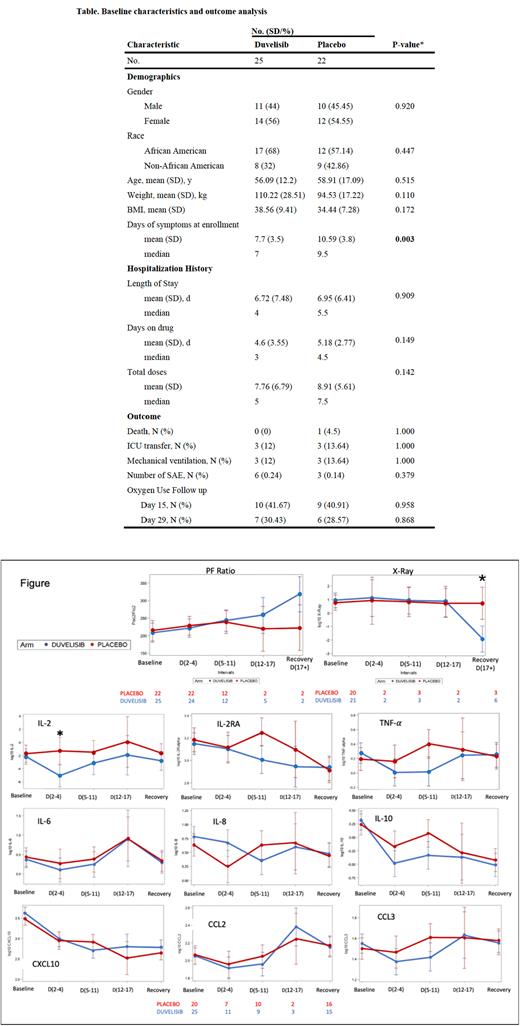Abstract

Background: ARDS following SARS-CoV-2 infection (COVID-19) is associated with the development of a hyper-inflammatory cytokine storm. Several anticancer drugs were repurposed for COVID-19 investigational treatment due to their favorable effect on immune profiles. Duvelisib (Copiktra, IPI-145, DUV) is an FDA-approved oral PI3K delta/gamma (PI3Kδ/γ) inhibitor for treating relapsed or refractory CLL/SLL and FL. PI3Kδ/γ inhibitors promote the formation of a pool of T-cells with a memory phenotype by inhibiting aerobic glycolysis, preventing T-cell activation-mediated terminal differentiation and exhaustion. Therefore, we hypothesized that duvelisib might limit hyperactivation of the immune system and mitigate T-cell exhaustion, promoting more effective anti-viral responses to SARS-CoV-2 and limiting the progression of COVID-19.
Methods: DAMPEN-CI was a single-center randomized placebo-controlled phase 2 study evaluating the efficacy of duvelisib, a PI3Kδ/γ inhibitor, in reducing inflammation and the incidence of respiratory failure in non-intubated adults with severe (RR>30, HR>125, O2 sat<93%, and PaO2/FiO2<300) PCR- and X-Ray-confirmed COVID-19 pneumonia. Pts were analyzed per-protocol. The primary endpoints were the fraction of subjects who required mechanical ventilation or died within 29 days of randomization. Critical secondary endpoints included serious adverse events (SAE, Grade 3/4), ICU transfer, duration of hospitalization, oxygen use, inflammatory biomarkers (Ferritin, CRP, d-dimer), and serum cytokine levels (e.g COVID-19 progression related) detected by a high-sensitivity multiplex electrochemiluminescent immunoassay. Safety monitoring included serial blood counts and renal and hepatic function measurements.
Results: A total of 47 pts (DUV=25, Placebo=22) were enrolled and randomized to receive DUV 25mg orally b.i.d or matching placebo for up to 14 days. The median age of the pts was 57 years. Baseline characteristics were well balanced between both arms (Table) other than pts in the DUV arm had shorter duration of symptoms at enrollment (7 vs. 9.5 days; p=0.003). All pts received remdesivir and dexamethasone as standard treatment. Median doses of study drug and days on treatment were 7 (5 vs. 7.5; p=0.142) and 4 (3 vs. 4.5; p=0.149), comparing DUV vs. placebo arms, respectively. One pt in the placebo arm died on Day 29. No significant difference was found in the primary composite endpoint of death or mechanical ventilation (12% vs. 13.64%; p=1.000) or ICU transfers (3 vs. 3). The PaO2/FiO2 ratio trended higher, and the chest X-ray severity score was lower in the DUV arm during the recovery phase (>Day 17). The SAE numbers (6 (0.24) vs 3 (0.14); p=0.373), median days of hospitalization (4 vs 5.5; p=0.909), oxygen use on day 15 (41.67% vs 40.91%; p=0.958) and day 29 (30.43% vs 28.57%; p=0.868) showed no significant differences in DUV vs. placebo arm (Table). Serum levels of IL-2 was significantly lower at early timepoints (Day 2-4) in subjects randomized to the DUV Arm. IL-2RA, IL-10, TNF-α, and MIP-1α/CCL3 were generally lower in DUV-treated subjects during the first two weeks. IL-6, IL-8, IP-10/CXCL10, and MCP-1/CCL2 levels were not significantly different between arms (Figure). Inflammatory biomarkers (Ferritin, CRP, d-dimer), anti-SARS Cov-2 IgG, and hematological parameters (CBC, CMP) were not significantly different between arms.
Conclusions: The administration of short-course duvelisib to pts with severe COVID-19 was safe and did not impair serological response to SARS-CoV-2. While duvelisib reduced levels of IL-2, IL-2RA, and TNF-α, clinical outcomes for duvelisib-treated patients did not significantly improve compared to control subjects. The small sample size and sampling restricted to a short hospitalization may have limited the observed effects of duvelisib on other cytokines in the blood. These data suggest a regulatory role for the PI3K/AKT/mTOR pathway in T cell response to COVID-19 progression and the potential efficacy of duvelisib in treating pts with hyper-inflammatory conditions. Early initiation, and/or higher-dose, longer-term treatment might be necessary to achieve clinical therapeutic benefits. Further high-dimensional analysis on immunophenotyping of immune cells is needed to determine the effect of duvelisib in altering immune profile, mitigating T-cell exhaustion, and enhancing anti-viral adaptive immunity.
Disclosures
Coma:Verastem Oncology: Current Employment. Pachter:Verastem Oncology: Current Employment. Waller:Orca Bio: Research Funding; Verastem Oncology: Consultancy, Membership on an entity's Board of Directors or advisory committees, Research Funding.
OffLabel Disclosure:
Duvelisib is an FDA-approved oral PI3K inhibitor for use in the third line for R/R CLL/SLL and FL. This trial reports data from a COVID-19 treatment phase II trial.
Author notes
 This icon denotes a clinically relevant abstract
This icon denotes a clinically relevant abstract
Asterisk with author names denotes non-ASH members.


This feature is available to Subscribers Only
Sign In or Create an Account Close Modal